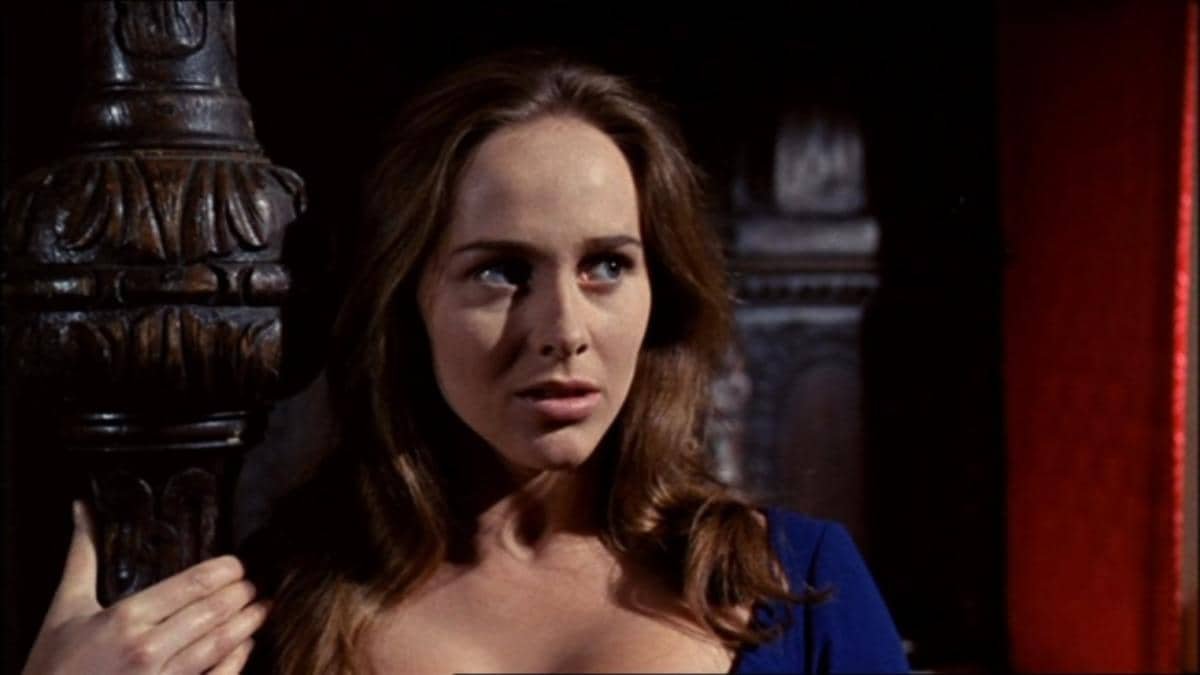[Editorial] In Her Eyes: Sara Lowes in Witchfinder General (1968)
In Witchfinder General we see the violent campaign of Matthew Hopkins, self-appointed Witchfinder General who cut a swathe through the English countryside during the English Civil War.
The film follows Hopkins as he paints the verdant fields of pastoral England with the blood of innocent people accused of witchcraft and consorting with the devil. One of these victims is Sara Lowes, a woman targeted first because of her affiliation with her uncle and then because Hopkins is, alongside being a murderer, racketeer and a general affront to humanity, also a sexual predator.
Whilst I would make no claims as to the historical accuracy of Witchfinder General, it isn’t difficult to relate the experience of Sara to the lived reality of women alive during Hopkins’ reign of terror. Sara is a woman condemned from the start, first because of her religious beliefs, that are suddenly in opposition with those held by the powers that be and then because she is a young, vibrant woman who catches the eye of evil men who have been taught that the world is theirs for the taking and have been given the ability to punish those who refuse them. It is unfortunate that this film, although made in 1968, doesn’t feel that far away from life for many women today, with sexual violence, social judgement and the danger of a lack of independence evident throughout the film.
Whilst the themes of sexual violence, misogyny and wider patriarchal structures aren’t explicitly explored in Witchfinder General, watching it through a contemporary lens does give rise to the interesting dynamics at play with all the men Sara comes into contact with. Her relationship with Richard is surprisingly modern and progressive, at least within their romantic relationship prior to the arrival of Matthew Hopkins, and in his treatment of her as a survivor of sexual violence. During a scene in Sara’s uncle’s church we see the word WITCH scrawled in enormous letters across a wall. This word, and all its associated horrors, are writ large on Sara’s face when she sees Richard’s return. She is adrift in a violent and unloving world and has to fear that the only person she has left will abandon her as well. Instead, whilst Richard wants revenge for Sara, he does not love her any less, or see her as ‘soiled’ or damaged as a result of Hopkin’s predation. This is in direct contrast to Hopkins himself, who, after finding out that his colleague Stearne has attacked Sara, loses all interest in her, and therefore in safeguarding her uncle. This serves to emphasise Richard’s role, at least at this point, as ‘hero’ and confirms Hopkins’ wickedness. It also raises interesting questions about the nature of sexual violence, particularly with regard to power dynamics. That Hopkins does not see himself as a rapist, because Sara ‘willingly’ sacrifices herself, but acknowledges that Stearne, with his overt display of violence, is a brute, shines a light on the nature of consent and how it can be weaponized.
CRAVING EXCLUSIVE EXTRA CONTENT? CHECK THESE OUT!
Whilst Sara spends much of the film either fleeing from men, or running towards them, she is also an independent player in her own life. When she offers herself sexually to Hopkins, in exchange for her uncle’s safety, she demonstrates that she is not naïve or unaware of the nature of the world. When she finds herself in danger later in the film, she is vocal in her concerns. She watches the violence metered out by Hopkins and Stearne, seeing the horror for herself and does not turn away.
However, this horror, predictably, takes its toll. At the close of the film we see Sara dissolving into the ruins of her life, screaming uncontrollably in the face of violence and torture. It is a stark reminder that revenge can never right the wrong it seeks to punish, nor can it remove pain, or the memory of suffering. Throughout the film, Sara is a woman who suffers greatly for her relationship with the men around her. First, her uncle who, even when aware of imminent danger, doesn’t do enough to safeguard her. Then Matthew Hopkins who sees in her an opportunity to exert his small, cruel need for power and control.
Also Stearne attacks Sara out of a perverse jealousy because cannot stand to see Hopkins keeping something from him. And finally, Richard, who has become so driven by the desire for revenge that he has forgotten the love that inspired it. In his final revenge on Hopkins, we can see that it does not stem from a need to protect Sara, but out of a longing to reclaim what was stolen from him. This is not about Sara’s pain, or helping her to heal from the trauma she has suffered. This is a poignant ending when taken in the context of the witch trials specifically, a time when women were accused by friends, neighbours and even their own family, and, more generally, the ongoing treatment of women to this day. Sara is a vivid representation of all the women who have suffered at the hands of wickedness perpetrated by sinners like Matthew Hopkins and the communities that enable them and in that way she remains an important figure for analysis today.




![[Editorial] In Her Eyes: Sara Lowes in Witchfinder General (1968)](https://images.squarespace-cdn.com/content/v1/5fe76a518d20536a3fbd7246/1655655953171-8K41IZ1LXSR2YMKD7DW6/hilary-heath.jpeg)
![[Editorial] The Babadook (2014)](https://images.squarespace-cdn.com/content/v1/5fe76a518d20536a3fbd7246/1651937631847-KR77SQHST1EJO2729G7A/Image+1.jpg)
![[Editorial] In Her Eyes: Helen Lyle in Candyman (1992)](https://images.squarespace-cdn.com/content/v1/5fe76a518d20536a3fbd7246/1649586854587-DSTKM28SSHB821NEY7AT/image1.jpg)
![[Editorial] Lorraine Warren’s Clairvoyant Gift](https://images.squarespace-cdn.com/content/v1/5fe76a518d20536a3fbd7246/1648576580495-0O40265VK7RN03R515UO/Image+1+%281%29.jpg)
![[Editorial] Sara in Creep 2 (2017)](https://images.squarespace-cdn.com/content/v1/5fe76a518d20536a3fbd7246/1646478850646-1LMY555QYGCM1GEXPZYM/27ebc013-d50a-4b5c-ad9c-8f8a9d07dc93.jpg)
![[Editorial] Sally Hardesty in The Texas Chainsaw Massacre (1974)](https://images.squarespace-cdn.com/content/v1/5fe76a518d20536a3fbd7246/1637247162929-519YCRBQL6LWXXAS8293/the-texas-chainsaw-final-girl-1626988801.jpeg)
![[Editorial] Margaret Robinson: Hammer’s Puppeteer](https://images.squarespace-cdn.com/content/v1/5fe76a518d20536a3fbd7246/1630075489815-33JJN9LSGGKSQ68IGJ9H/MV5BMjAxMDcwNDI2Nl5BMl5BanBnXkFtZTcwOTMxODgzMQ%40%40._V1_.jpg)
![[Editorial] Re-assessing The Exorcist: Religion, Abuse, and The Rise of the Feminist Mother.](https://images.squarespace-cdn.com/content/v1/5fe76a518d20536a3fbd7246/1629995626135-T5K61DZVA1WN50K8ULID/image2.jpg)
![[Editorial] Unravelling Mitzi Peirone’s Braid (2018)](https://images.squarespace-cdn.com/content/v1/5fe76a518d20536a3fbd7246/1628359114427-5V6LFNRNV6SD81PUDQJZ/4.jpg)















![[Editorial] Oscar Nominations 2026: Where to stream all the horror picks](https://images.squarespace-cdn.com/content/v1/5fe76a518d20536a3fbd7246/1769113319180-4INRRNMZK4DZLHRSUXX5/rev-1-GRC-TT-0026r_High_Res_JPEG-1024x372.jpeg)
![[Editorial] 10 Films & Events to Catch at Soho Horror Film Fest 2023](https://images.squarespace-cdn.com/content/v1/5fe76a518d20536a3fbd7246/1700819417135-299R7L4P0B676AD3RO1X/Screenshot+2023-11-24+at+09.41.52.png)
![[Editorial] 9 Horror Nintendo Switch Games To Play](https://images.squarespace-cdn.com/content/v1/5fe76a518d20536a3fbd7246/1697214470057-3XZXX8N4LYIMDFWS6Z3P/Screenshot+2023-10-13+at+17.20.13.png)
![[Mother of Fears] Mothering in Silence in A Quiet Place (2018)](https://images.squarespace-cdn.com/content/v1/5fe76a518d20536a3fbd7246/1696445921315-HZJ2DZYQIH6VVWXBO2YL/Screenshot+2023-10-04+at+19.52.29.png)
![[Editorial] 5 Female Focused Horror Book Recommendations](https://images.squarespace-cdn.com/content/v1/5fe76a518d20536a3fbd7246/1696441981361-52EQCTJ7AT2QF1927GM7/919xtm6d3fL._AC_UF894%2C1000_QL80_.jpg)
![[Editorial] 9 Best Slashers Released Within 10 Years of Scream (1996)](https://images.squarespace-cdn.com/content/v1/5fe76a518d20536a3fbd7246/1695478839037-LOFHGVM3H6BMSZW7G83M/Screenshot+2023-09-23+at+15.15.11.png)
![[Mother of Fears] Mother Vs. Monster in Silent Hill (2006)](https://images.squarespace-cdn.com/content/v1/5fe76a518d20536a3fbd7246/1695485781119-H6GNP0G3J2TLPAOIABV7/Screenshot+2023-09-23+at+17.11.56.png)
![[Editorial] 9 Terrifying Cerebral Visions in Horror Movies](https://images.squarespace-cdn.com/content/v1/5fe76a518d20536a3fbd7246/1693509801235-X23OL50T1DVGECH0ZJK2/MV5BMjQ0MTg2MjQ4MV5BMl5BanBnXkFtZTgwMTU3NDgxMTI%40._V1_.jpg)
![[Mother of Fears] I Don’t Wanna Be Buried in a Pet Sematary (1989) and (2019)](https://images.squarespace-cdn.com/content/v1/5fe76a518d20536a3fbd7246/1691328766069-QFNAVJOMFZVZ5CLU1RWM/Screenshot+2023-08-06+at+14.23.13.png)
![[Mother of Fears] How I Love to Love Nadine in The Stand (2020)](https://images.squarespace-cdn.com/content/v1/5fe76a518d20536a3fbd7246/1690213172707-TKM9MZXK02EVCIX30M1V/Screenshot+2023-07-24+at+16.29.11.png)

Possessor is a slick futuristic thriller in which Tasya Vos, an assassin for hire, must manage her responsibilities as an elite killing machine and complex feelings towards her husband and son, whilst taking on another high-profile job that will push her to the edge of her sanity.